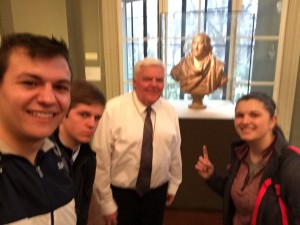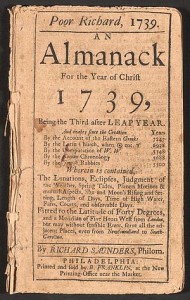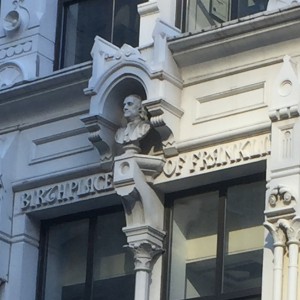Rachel Fancy, Kally Morse, Tom Charpentier, Zach Castagnola
In a response to The Royal Academy of Brussel’s inquiry for more scientific writing, Benjamin Franklin penned a satirical piece in 1781 titled “To The Royal Academy of XX (Farting),” as a mocking commentary on the increase in pointless scientific discovery that didn’t relate to the everyday common man. At the time, Franklin was in Paris as an American ambassador to France, and grew tired of the impracticality of modern science. This piece pokes fun by proposing to find a drug to rid the common men of a problem they have faced for ages. Franklin’s proposal was to be able to relieve oneself of gas and still have your respect from others kept intact.
In “To The Royal Academy of XX (Farting),” Franklin quotes a demand of scientific discovery. Franklin employs satire to foster the idea that developing a drug to help remove the smell so gentlemen can relieve themselves of their “great Quantity of Wind” without the smell. Thus people could fart without it being noticed and their dignity would still be intact. Another benefit of this drug would prevent the offense of guests in the presences of someone who farted, “That we already have some Knowledge of Means capable of varying that Smell” people are familiar with the smell and see this as distasteful so the drug would save the consumer from humiliation. Franklin then goes on to compare cutting the cheese with the same as blowing your nose or spitting in public if farting wasn’t accompanied by a distasteful smell. At one point in the letter, Franklin poses the question: “Are there twenty Men in Europe at this Day, the happier, or even the easier, for any Knowledge they have pick’d out of Aristotle?” Franklin is making a point that we need more scientific discoveries that will help people, as opposed to pointless abstract theories that were popular at the time.
Although Franklin ultimately only sent the letter to some friends his use of political satire in his previous works have helped point out various political problems. In the case of the letter “To The Royal Academy of XX,” he is calling out the pointless scientific endeavours that are using up time and money. Rather than fund what he thinks are wasteful ideas, he suggests that they try to find a way to make farts smell better. Obviously, Franklin is not seriously requesting they do this but it brings to light the ridiculousness of the current scientific community.
This essay we lighthearted and easy to read and understand. As a group we felt that this piece by Franklin was quite funny as opposed to some of his other pieces where the humor escaped us. The sheer mockery and his word play really take this piece over the top. We especially liked his word play of “FART-HING” which was a nice pun to end with and his word exchange of farting with “great wind”. Although this piece was quite comical Franklin doesn’t end up sending the essay to the Royal Academy of Brussels more so to some of his friends so they too can have a nice laugh at the expense of the Royal Academy.





